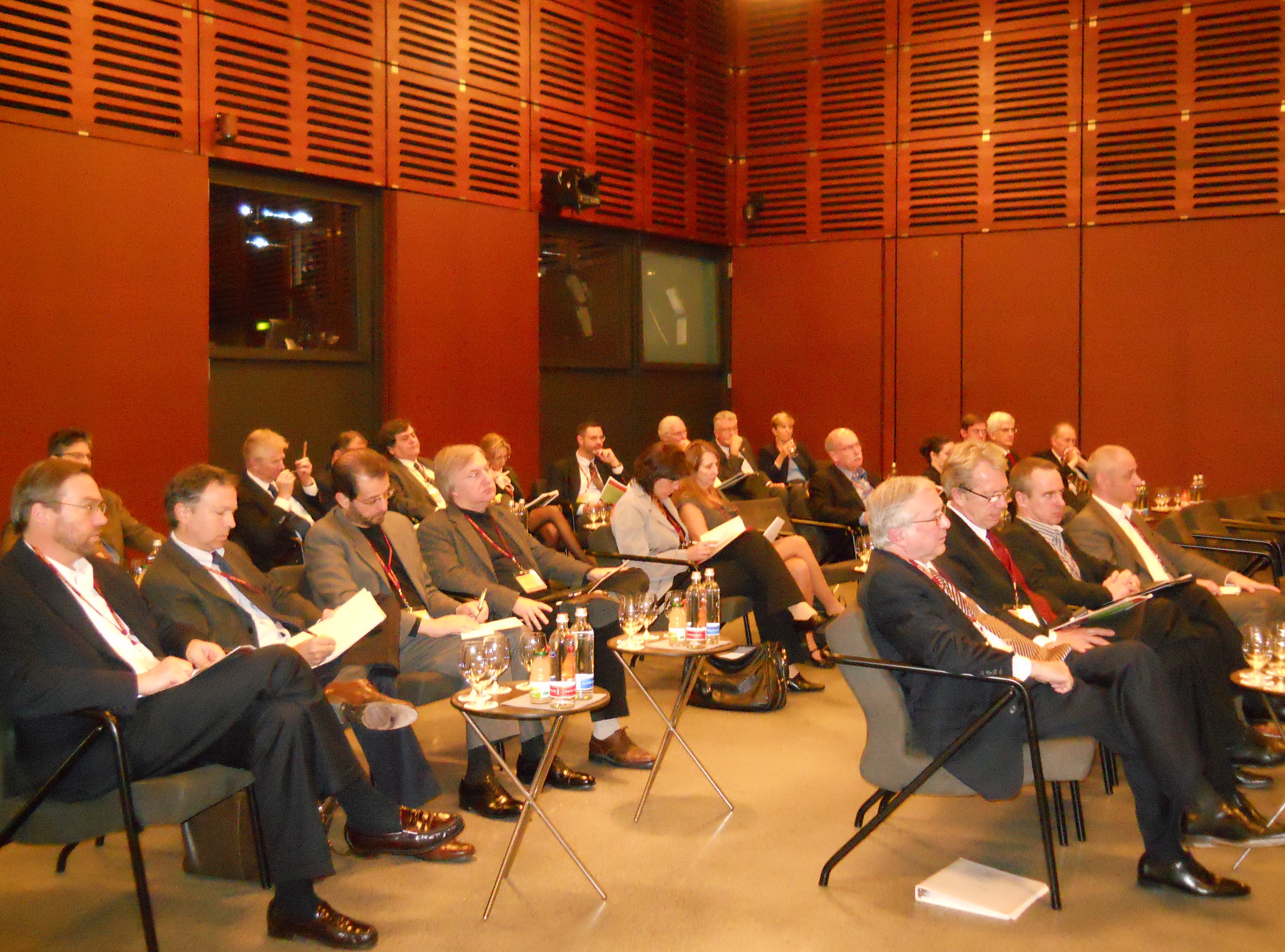Virginia Tech conference on community resiliency strives to bridge gap between scientists, practitioners

Bridging the gap between scientists and practitioners to ensure that the best science and technologies are appropriately used to enhance community resiliency was the overriding theme at a recent international conference held at the Swiss Re Centre for Global Dialogue in Zurich, Switzerland.
Entitled Integrated Risk, Response, and Recovery Policy and Management: International Perspectives across Multiple Scales, the conference was organized by the Center for Community Security and Resilience in the National Capital Region. In opening remarks Virginia Tech President Charles W. Steger told the group of 35 attendees, “Given the increased probability of major disruptive incidents, governments, NGOs, businesses, and academic institutions have been working to improve our ability to prevent such occurrences where possible, and when they do occur, to respond and recover quickly enough to avoid human, environmental, and economic systems from reaching catastrophic breakdowns.
“We are here to explore how to improve our means and methods to create greater resiliency in our people and communities. Our goal is to develop some ideas that will help make policy makers and managers better able to predict and manage the consequences of the complex interactions that occur when existing systems are disrupted by disastrous events,” Steger said.
There were five panel discussions during the two-day conference:
- Resiliency Issues – Integrating Science and Practice. The rapid and effective translation of research to practice and the communication of best practices across communities are critical to community security and resiliency. Despite the critical importance of this translation, how best to accomplish it has not been successfully resolved. Bridging science and community to share insights and develop solutions is important to the process of securing communities. This panel focused on identifying some of the issues that impede sharing and on strategies that can be used in the future to help translate science relevant to both professionals and citizens responsible for the security and resiliency of communities.
- Inter-Jurisdictional Challenges. The major events that pose serious threats to the security and resiliency of communities transcend political boundaries; yet, prevention, response and recovery efforts must be coordinated across jurisdictions to be effective. Poor communication and coordination across communities will exacerbate conditions and create a climate that may impede future cooperation in increasing community resiliency. This panel provided insight into the nature of inter-jurisdictional conflicts and how these challenges have been addressed at different scales of governance.
- Technologies and Resiliency. Advanced developments in a range of technologies including informatics, sensors, and integrated management systems, offer opportunities to prevent some threats, respond more effectively to the consequences of an event, and to speed recovery. This panel addressed several of these new technologies and their capacities for helping communities cope with a wide range of threats. Approaches used in Europe and in the United States were highlighted in these discussions.
- Dimensions of Resiliency. Resiliency is a multidimensional concept with significant interdependencies between system elements. Not only is it imperative to understand the dimensionality of resiliency but to grasp the complexity of the interdependencies and the potential consequences arising from them. This panel examined several of these dimensions -- infrastructure, community -- and the potential “cascading” effects of interdependencies.
- Mitigating Consequences through Response and Recovery. The initial and subsequent responses to the consequences of a major disruption caused by unanticipated events are critical to the subsequent ability of a community to resume some normality in the activities of its institutions and population. No single response plan is appropriate to all events, so how best to respond must be understood to ensure minimal negative consequences and to enhance a quicker return to normalcy. A host of issues are critical to response strategies -- severity, available resources, jurisdictional coordination -- to name but a few. This panel articulated some of these critical issues and provided some “best practice” approaches for communities.
Among those who presented papers at the conference were Virginia Tech National Capital Region faculty: Chris Barrett, professor and director, Network Dynamics and Simulation Science Laboratory and Virginia Bioinformatics Institute; Jack Harrald, research professor and adjunct professor of public policy, Virginia Tech Center for Technology, Security, and Policy; Fred Krimgold, director, Disaster Risk Reduction Program, Advanced Research Institute; and Lamine Mili, program director, Electrical and Computer Engineering.
Serving as panel chairs were: James Bohland, vice president and executive director, and Nicholas Stone, professor and deputy director of Virginia Tech National Capital Region Operations, and Theresa Jefferson, research associate professor in the Center for Technology, Security, and Policy.
In addition to formal presentations, the conference provided time for discussion and networking. Bohland closed the two-day event with remarks that included a summary of the conference sessions.
“This workshop was an initial effort by the Center for Community Security and Resilience to begin a dialogue on important issues pertaining to community security and resiliency … much remains to be researched and further dialogue is needed. To that end, the center will continue to offer venues for presentations, discussion and debate on the critical issues within this research domain,” Bohland said. “We would be pleased to have all of you as part of that engagement in future years.”
A second community resiliency conference is scheduled for Sept. 18, 19 and 20, 2011, in the new Virginia Tech Research Center – Arlington, scheduled to open in June 2011.
The Center for Community Security and Resilience is a Virginia Tech, IBM Research, and Arlington County partnership formed to conduct research and create solutions to help secure communities and ensure their capacity to recover from and adjust to changes brought about by catastrophic events. The center’s research agenda addresses both the technological and societal dimensions of the overall challenge, enhancing community resilience through robust environmental services, critical infrastructure, and health-related services while safeguarding the individual’s freedoms.




